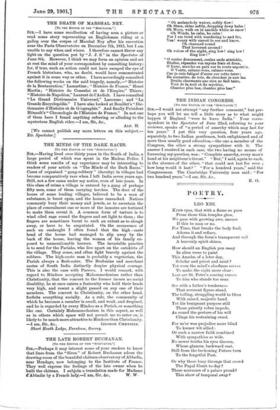THE MINDS OF THE DARK RACES.
(To THE EDITOR OF THE "SPECTATOR.")
Sin,—Having lived over thirty years in the South of India, a large period of which was spent in the Madras Police, I think some results of my experience may be interesting to readers of your article on "The Minds of the Dark Races." Cases of organised " gang-robbery " (dacoity) in villages had become comparatively rare when I left India seven years ago. Still, not a few came under my notice, even of late years. In this class of crime a village is entered by a gang of perhaps fifty men, some of them carrying torches. The door of the house of some leading villager, believed to be a man of substance, is burst open, and the house ransacked. Natives commonly bury their money and jewels, so to ascertain the place of concealment one or more of the inmates are tortured to make them reveal it. A common form of torture is to wind oiled raga round the fingers and set light to them ; the fingers are sometimes burnt to such an extent as to slough away, or have to be amputated. On the occurrence of such an onslaught I often found that the high - caste head of the house had managed to slip away by the back of the house, leaving the women of his family ex- posed to unmentionable horrors. The invariable practice is to send for the Pariahs, who live apart on the outskirts of the village. They come, and often fight bravely against the robbers. The high-caste man is probably a vegetarian, the Pariah always a flesh-eater. The Brahmins and merchant castes of South India distinctly despise physical courage. This is also the case with Parsees. I would remark, with regard to Hindoos accepting Mahommedanierm rather than Christianity, that the convert to the former incurs no social disability, he at once enters a fraternity who bold their heads very high, and resent a slight passed on any one of their members. The convert to Christianity, on the other hand, forfeits everything socially. As a rule, the community of which he becomes a member is small, and weak, and despised, and he is regarded by every Hindoo as a Pariah, or something like one. Certainly Mahommedanism in this aspect, as well as in others which space will not permit me to enter on, is likely to be much more attractive to Hindoos than Christianity.




















































 Previous page
Previous page